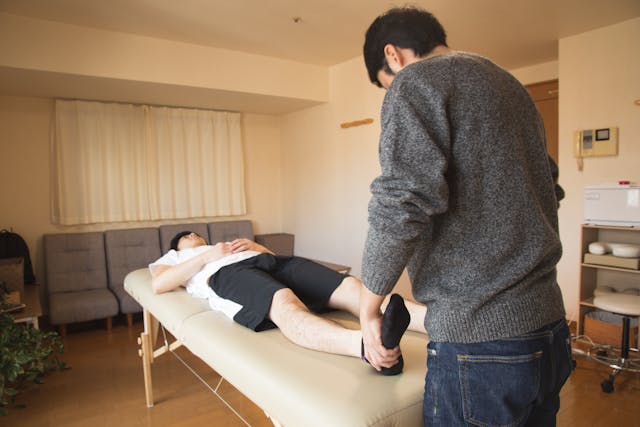Physiotherapy for Posture Correction: Long-Term Benefits Explained
Posture is a crucial aspect of overall health that is often overlooked until problems arise. Bad posture can lead to various issues, including chronic pain, musculoskeletal imbalances, and even reduced mobility. Physiotherapy is a highly effective approach for correcting posture-related problems, focusing on improving alignment, strength, and flexibility. We will explore the long-term benefits of https://fixio.com.au/manly-physio/ for posture correction, shedding light on how it can alleviate existing issues and prevent future complications. Physiotherapy provides a holistic method for lasting posture improvement through targeted exercises and techniques.
Understanding the Role of Physiotherapy in Posture Correction
Physiotherapy plays a pivotal role in addressing posture issues by identifying the root causes of misalignment and offering solutions to correct them. Poor posture often stems from weak muscles, tight areas, and improper movement habits. Physiotherapists use a thorough assessment to determine the specific imbalances in a person’s posture and create a personalized treatment plan to correct them. These plans typically include strengthening exercises for weak muscles, stretching techniques for tight areas, and postural re-education to reinforce proper movement patterns. By focusing on these areas, physiotherapy offers a multifaceted approach to long-term posture improvement, ensuring that the symptoms and the underlying causes of poor posture are addressed.
Strengthening Muscles for Improved Posture
One of the fundamental benefits of physiotherapy for posture correction is strengthening key muscle groups that support proper alignment. Weak muscles, particularly in the core, back, and shoulders, are often at the heart of poor posture. When these muscles are not strong enough to support the body’s structure, individuals may compensate by adopting improper postural habits, such as slouching or rounding the shoulders. Physiotherapists design exercises to target these muscles and help them become stronger and more resilient. By improving muscle strength, the body can better maintain an upright, balanced posture with less effort, reducing the risk of strain and discomfort over time. Strengthening exercises also enhance the stability of joints and the spine, contributing to better posture and overall musculoskeletal health.
Improving Flexibility for Optimal Alignment
In addition to strengthening muscles, physiotherapy addresses the importance of flexibility in maintaining good posture. Tight muscles and stiff joints can severely restrict movement and contribute to misalignments, especially in the neck, back, and hips. Physiotherapists use various stretching and mobilization techniques to increase the flexibility of these areas, improving the range of motion and allowing for better postural alignment. Stretching exercises help reduce muscle tension, alleviate discomfort, and promote fluid movement. Increased flexibility enables individuals to perform tasks with less strain and discomfort, such as sitting for extended periods, lifting objects, or standing for long durations. By improving flexibility, physiotherapy creates a balanced body that can move more freely and comfortably, supporting better posture in motion and at rest.
Postural Re-Education for Lasting Habits
Another critical aspect of physiotherapy for posture correction is postural re-education. It’s not enough to strengthen muscles and improve flexibility; individuals must also learn to maintain these improvements throughout daily activities. Physiotherapists work closely with patients to teach them how to adopt and sustain good posture habits in static positions and while moving. This may include guidance on proper sitting, standing, and walking techniques to avoid strain and encourage optimal alignment. Incorporating these habits into daily routines makes individuals less likely to slip back into old, harmful postural patterns. Postural re-education is essential to long-term success in posture correction, helping individuals integrate the changes into their lifestyle and prevent future issues.
Pain Relief and Prevention Through Posture Correction
One of the immediate benefits of physiotherapy for posture correction is pain relief. Poor posture often leads to chronic pain, particularly in the neck, shoulders, and lower back. Misaligned posture can place undue stress on muscles, ligaments, and joints, leading to discomfort and even injury. Through physiotherapy, individuals can reduce this pain by correcting postural imbalances and improving the alignment of their body. By addressing the root causes of pain, physiotherapy provides relief and helps prevent future flare-ups. With improved posture, the body is better equipped to handle the physical demands of daily life, reducing the likelihood of strain and injury. Over time, physiotherapy can help individuals break the cycle of chronic pain associated with poor posture and enjoy a more comfortable, pain-free existence.
Long-Term Health Benefits of Posture Correction
The long-term benefits of physiotherapy for posture correction extend far beyond pain relief. Improved posture has a positive impact on overall health and well-being. For instance, better posture promotes optimal breathing, allowing the chest and diaphragm to expand fully, improving lung capacity and oxygen intake. It can also enhance circulation, as proper alignment ensures that blood flow is not restricted. Furthermore, posture correction can improve digestion, allowing for better abdominal positioning and reducing pressure on internal organs. By maintaining a healthy posture over the long term, individuals can experience increased energy levels, improved mood, and a greater sense of vitality. Physiotherapy addresses the immediate effects of poor posture and supports long-term health by helping individuals maintain optimal alignment throughout their lives.
Physiotherapy is an effective and holistic approach to correcting posture and improving long-term health. Through a combination of strengthening exercises, stretching techniques, postural re-education, and pain management, physiotherapy addresses the root causes of poor posture and offers lasting benefits. The long-term advantages of posture correction extend to improved physical health, such as pain relief, better flexibility, and a reduced risk of future musculoskeletal issues. Additionally, the psychological benefits of improved posture, such as increased confidence and a more positive outlook, should not be underestimated. Individuals can enjoy a more comfortable, healthy, and balanced life by committing to physiotherapy for posture correction.

